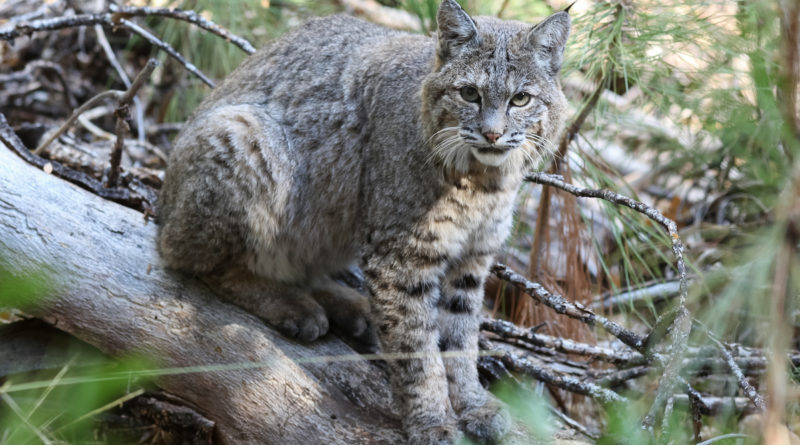The Encounter
There’s a moment of awe when you spot a bobcat in the wild. But what does it see?
By Leath Tonino
Do you remember the time? I was driving, you were sitting to my right, the summer day was blurring by—birches and maples, blue jays and northern flickers, the Green Mountains’ vibrant green. Neither of us knew what the hell we were looking at, some moving thing the color of the road’s dirt and, in places, in the pattern of leaves, the color of shadow. The windows were down, the radio off, the Jeep bumping along. I eased us to a stop and the animal stopped too, right there, fifteen feet ahead. We cursed for joy. We sang dirty words of surprise and disbelief and gratitude for our good fortune.
I’d never seen a bobcat in the wild, never looked into a bobcat’s face and felt a bobcat looking back, and neither had you. It really shut us up, that feeling, really stopped our mouths and minds. I know it sounds cheesy, but it’s true—it was the eyes.
We stared and the bobcat stared and the shared staring bonded us, everything pausing and deepening and stilling.
It’s one thing to catch a glimpse of a secretive animal, but to catch a secretive animal catching you, to feel the mirrored fascination, to see that it has a face like yours, with ears and nose, a mouth and eyes, to see that it casts its senses into the world like a soft net, as you do, as I do, and with that net retrieves the faces swimming out from the shadows and the sun…
Well, what can I say? It shut us up and shut us up fast. That seems to say it all.
But do you remember the thing that happened later, after the bobcat broke the trance, disappeared into the woods, after we drove away, talked manically, swore some more, laughed and felt blessed and went quiet? What I remember is feeling sad. No, what I remember is feeling ashamed. My outward gaze turned inward. So quickly I realized we’d done wrong.
That bobcat we saw, that bobcat we admired, what did it see? Bumping along again through the shadows and sun, the blur of birches and maples and woodpeckers and jays, it hit me in a painful way—it saw a Jeep. It gave us its perfect body and we gave it a jeep. It gave us its eyes and we gave it a windshield. In return for fur we offered steel. It presented itself honestly, but we did not. We took without giving. We absorbed without being absorbed. Unaware that we were doing so, we played ourselves off as a machine.
Sure, it would be easy to say that the bobcat didn’t care, only stopped in fear or surprise, that bobcats don’t discern between a Jeep and a human, that they don’t find beauty in their surroundings, that they don’t cast their senses like a soft net into the world as we do, or for the same reasons. But you were there. You saw the eyes. It was trying to look. It was looking. I can’t say what exactly it was looking for, but I can say with certainty that it was looking.
Beers. A jump in the pond. A bonfire that night, the flames licking up, the owls hooting and scooping overhead. We told the story and our friends were excited and since then I’ve told the story to others who also were excited. But now I’m telling a different story, the one I felt when the Jeep bumped along and we both finally went silent—the story of imbalance, of seeing but not being seen.
Old friend, it’s been years since we were last together and I know this is late in coming and I know you’re busy and all the rest. Please, though, I have something to ask of you: When you can, step out into the world as yourself—not your car, not your house, not your clothes or socks or hat or sunglasses, not your shampoo and soap, not your blaring music, not your little screens, not your machines.
Don’t steal yourself away from all the soft flung nets that would snag you, all the eyes and ears and noses and mouths that would see and hear and smell and taste you. Offer yourself, from time to time, to the millions of lives that knew you and me and all of us once, not that long ago.
What with the many tricks we’ve pulled, it’s a wonder they still like us, but they do. You saw the eyes. They like us and they miss us and they want us back. And we can give them that. We can take it easy, take a few deep breaths, step outside, and give them that.
Leath Tonino is the author of a forthcoming book of essays, The Animal One Thousand Miles Long, about explorations in Vermont, where he was born and raised. This is the first of several columns he will contribute.

